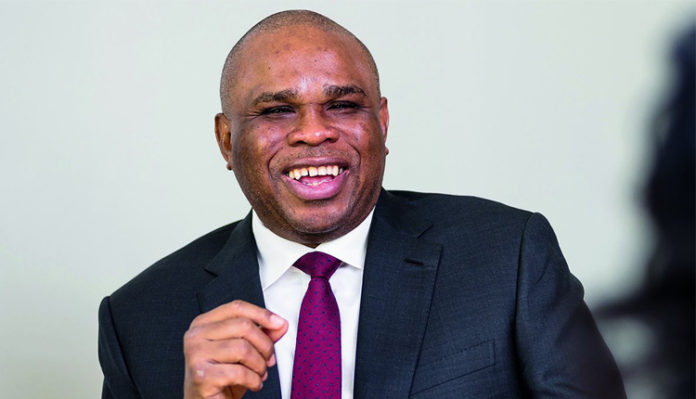By Destiny Day
Professor Benedict Oramah, President of African Export-Import Bank has urged the Nigerian government to sign the African Continental Free Trade Agreement (AfCFTA)without further delay.
He spoke amid controversies over Nigeria’s inability to take a firm decision on the signing of the AfCFTA, a year after majority of the 55 countries of the continent had endorsed the agreement.
Oramah gave the advice while speaking in Lagos on Tuesday as guest lecturer at the 2019 edition of the annual Bullion Lecture organised by the Centre for Financial Journalism (CFJ Nigeria).
Speaking on the topic “Leveraging the African Continental Free Trade Agreement to boost Nigeria’s economic development,” Oramah urged the Nigerian government to take urgent steps to endorse AfCAFTA in order to key into what he called a window of opportunity for the country to maximize its economic potential.
He expressed concern over the inability of the Nigerian government to endorse the Agreement which was produced from the decisions and milestones articulated at the Abuja Treaty of 1991 aimed at defining clear plans for Africa’s economic integration.
According to him, the AfCFTA was signed in Kigali, Rwanda on March 21, 2018 by 44 of 55 African countries while Nigeria which hosted the forum that gave birth to the initiative was yet to decide on what to do with it.
He said it was worrying to well-meaning Nigerians and other countries of Africa that a Treaty which Nigeria gave birth to had to be delivered in Rwanda while smaller countries that looked up to her had endorsed the Agreement and went forward to ratify it.
“The AfCFTA which was signed in Kigali, Rwanda on March 21, 2018, was in line with the Abuja Treaty expectations. So … the child that was conceived in Nigeria was born in Rwanda. And with the emergence of that child, Africa sees a renewed hope, a reinvigoration to chart a new course,” Oramah told the audience at the Civic Centre, Victoria Island, Lagos.
Tracing the historical and economic imperatives that necessitated the birth of the AfCFTA, the AFRIEXIMBANK boss noted that Africa benefited a little from many years it was ruled by colonial powers whose main focus was to draw the raw materials it needed for its home industries while it dumped its own manufactured goods in return.
He said the AfCFTA was meant to change the narrative as a continent that was called the “Basket Case”, is now on the path to becoming the “Bread Basket” of the world.
Enumerating the benefits of the AfCFTA to Africa and to Nigeria in particular, Oramah said the Treaty would create the environment for the continent to chart a new development path and eliminate the causes of weakness while upholding the areas of strength among the 55 countries of the continent.
He also said the initiative would create the required economic integration that would promote sub-regional and continental supply chains such as the automotive industry, as “the AfCFTA offers opportunity for African countries to begin to create and nurture infant industries”.
He added that “the AfCFTA creates opportunities for African economies, including Nigeria, to take over from China as the World’s manufacturing hub. China exports 45 billion US dollars of light manufacturers into Africa. Nigeria and other African countries can expect to fill that void if they take advantage of the tariff and non-tariff reductions in the AfCFTA.”
The Afreximbank chief said that Nigeria stands a great chance of enlarging its Foreign Direct Investment (FDI) inflows through the AfCFTA given its position as the largest economy and the most populous in Africa.
He said a survey conducted by AFRIEXIMBANK showed that 69 per cent of Nigerian businesses believed that AfCFTA would be advantageous to the country in three main areas namely creating a better business environment, promotion of local businesses and business growth and expansion.
He however identified a number of constraints that the Nigeria must overcome in order to reap the benefits that the AfCFTA offers. These include creating conducive macroeconomic policies that support increased regional trade.
Strategic steps should be taken to introduce policies that encourage FDI flows to sectors that have the highest potential for foreign trade, namely light manufacturing and agriculture, he said.
According to him, the challenge of lack of appropriate financing should be addressed through specific monetary and trade policies that target the potentials of each country towards maximizing the competitive advantage inherit in each economy.
He said 49 out of 55 African countries had signed the AfCFTA Agreement while 20 countries had ratified it.
Furthermore, 16 countries had deposited their instruments of AfCFTA ratification with the Chairperson of the African Union Commission as additional four countries had received parliamentary approval for the ratification of the Agreement.
He enumerated many areas that Afreximbank had supported African businesses to overcome their growth challenges and noted that Nigeria was among the key beneficiaries of these measures. These include eliminating the poor product quality of many African businesses by instituting appropriate Quality Assurance Centres and offering Guarantees for facilities given by local banks to Small and Medium Enterprises (SMEs).
The event was chaired by the President/Chairman of Council, Chartered Institute of Bankers of Nigeria (CIBN), Uche Olowu while Ade Adefeko, Vice President, Corporate & Government Relations at OLAM Nigeria and Muda Yusuf, Director-General, Lagos Chamber of Commerce and Industry (LCCI) were on the panel of discussants.













